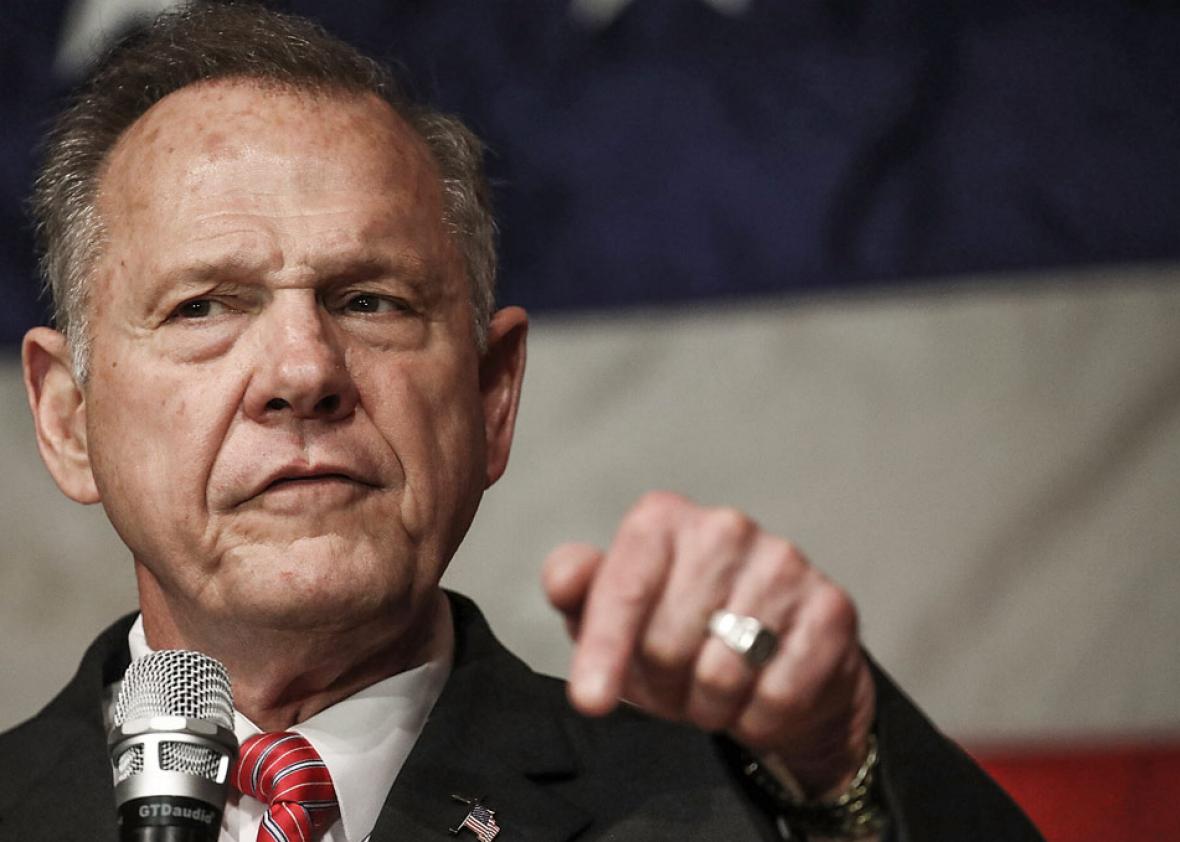“I believe the women,” said Senate Majority Leader Mitch McConnell on Nov. 13, days after Roy Moore, the Republican Party nominee for Senate in Alabama, was accused of inappropriate conduct with teenagers. Multiple women said Moore had pursued them as teenagers, while he was in his 30s, and one accuser said she was 14 years old when Moore tried to molest her.
McConnell’s comments that day went beyond his initial statement that Moore should leave the race if the allegations were true. By stating, plainly, that he believed the women, he was calling outright for Moore to leave the race, lest Republicans lose the seat to Democrat Doug Jones, who had gained a lead after the Washington Post reported the allegations. Soon after this statement, the Republican National Committee broke ties with the Moore campaign, leaving him to campaign on his own.
But as the story of Moore’s predatory behavior receded from the national news, he bounced back in the polls, and Republicans began to make peace with the fact that he was the party’s nominee. “Democrats refusal to give even one vote for massive Tax Cuts is why we need Republican Roy Moore to win in Alabama,” said President Trump on Twitter. “We need his vote on stopping crime, illegal immigration, Border Wall, Military, Pro Life, V.A., Judges 2nd Amendment and more.”
Soon after, McConnell walked back his criticism. “The people of Alabama are going to decide a week from Tuesday who they want to send to the Senate,” he said Sunday during an interview on CBS’s Face the Nation. “It’s really up to them. It’s been a pretty robust campaign with a lot of people weighing in. The president and I, of course, supported somebody different earlier in the process. But in the end, the voters of Alabama will make their choice.” On Tuesday, the RNC followed suit, restoring its support to Moore’s campaign.
Nothing substantive about the story has changed since the Post first broke the allegations. Moore’s accusers haven’t changed their stories, although Moore has changed his story on his memory of the women, first saying he remembered two of them and later denying that he knew any of them. What has changed is Moore’s political position. When he appeared weak and likely to lose, senior Republicans kept their distance. Now, with stronger prospects, they’re prepared to welcome him into the fold.
Call it the Access Hollywood phenomenon. Released one month before Election Day in 2016, the Access Hollywood tape was a 2005 recording of Donald Trump and host Billy Bush having a lewd conversation about women, in which Trump brags about aggressively kissing and groping women without their consent. When, during the second presidential debate, he was asked if he had ever committed these acts, he said no. “I didn’t say that at all,” Trump replied. “I don’t think you understood what was said. This was locker-room talk. I’m not proud of it. I apologized to my family, I apologized to the American people.”
Within days of this denial, multiple women made allegations of sexual assault, all describing the exact behavior Trump outlined in the video. All told, more than a dozen women accused Trump of sexual assault, charges that he denied.
Republican leaders moved quickly to distance themselves from their party’s nominee. “No woman should ever be described in these terms or talked about in this manner. Ever,” said RNC Chairman Reince Priebus.
“I am sickened by what I heard today. Women are to be championed and revered, not objectified,” said Speaker Paul Ryan, who later told House members that they should “do what’s best“ for them and their district with regards to endorsing Trump.
Jason Chaffetz, former congressman from Utah, withdrew his endorsement outright. “I’m out. I can no longer in good conscience endorse this person for president. It is some of the most abhorrent and offensive comments that you can possibly imagine,” he said in an interview with a local news station.
Eventually, however, the outrage over Trump’s comments and behavior trickled, as yet another controversy consumed the media’s attention. And as Election Day approached, and the race between Trump and Clinton tightened, Republican lawmakers began downplaying their criticism. “I will not defend or endorse @realDonaldTrump, but I am voting for him,” tweeted Chaffetz just a few weeks later. “Hillary Rodham Clinton is that bad. HRC is bad for the USA.” Three days after saying Trump should quit, Nebraska Sen. Deb Fischer reversed course. “I plan to vote for Mr. Trump and Mr. Pence on No. 8. I put out a statement … with regard to Mr. Trump’s comments. I felt they were disgusting. I felt they were unacceptable and I never said I was not voting for our Republican ticket.”
Trump, for his part, responded to the allegations by framing them as part of a global conspiracy to thwart his nationalist movement, echoing the anti-Semitic rallying cries of the alt-right. He claimed it was all orchestrated by Hillary Clinton, who “meets in secret with international banks to plot the destruction of U.S. sovereignty.” Moore has taken a similar tack, claiming a vast conspiracy to discredit him. On Tuesday, he even lashed out at billionaire (and conservative bête noire) George Soros, saying Soros fosters an agenda that is “sexual in nature” and implying that Soros is going to hell.
The thinly veiled anti-Semitism did little to dissuade Republicans from rallying around their candidate last year. By October’s end, Trump was back to where he was before the Access Hollywood tape: with the full support of the Republican establishment. Roy Moore is on the same path.
Republicans may condemn his predatory behavior toward teenagers, but they won’t abandon his campaign. Their major priority, tax reform, is deeply unpopular and the margin for passage is tight. They need the votes. And if that means looking past bigotry and sexual assault to get them, then that’s what they’ll do. It’s not the first time, and it won’t likely be the last.
